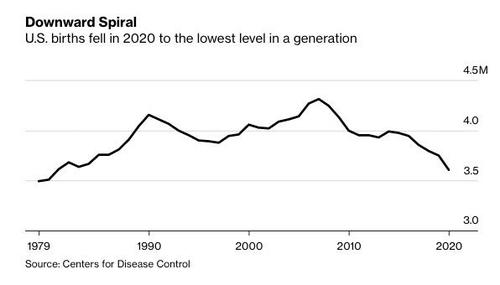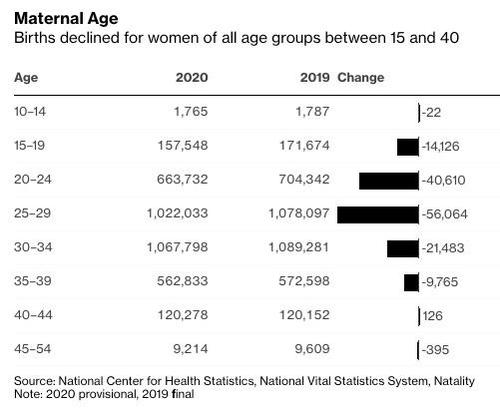US Births Fall To Lowest Level In A Generation Amid Pandemic “Baby Bust”
A little over a week ago, we reported on one of the biggest deflationary threats looming over the global economy: that is, China’s shrinking population, as deaths outpace births for the first time, a trend that demographers believe will only worsen as the impact of China’s one-child policy is felt on its population numbers.
And as Wall Street banks and America’s largest corporations complain about growing inflationary pressures in their sell-side research and earnings calls, the latest population update from the CDC has just confirmed that the deflationary trend of a falling birth rate continued last year in the US. In fact, one could argue this trend has been supercharged by the pandemic, thwarting theories about a lockdown “baby boom” as the number of births in the US fell by 4% in 2020, dropping to the lowest level since 1979.
Put another way: thanks to the pandemic, US birth rates have fallen to their lowest level in a generation.
Source: Bloomberg
Birth rates dropped across every race, ethnicity and age group – even teenagers (though teenage birth rates have been falling in the US for decades), according to the data, which was published by the CDC’s National Center for Health.
As we noted at the time, a shrinking population is bound to create serious challenges for China’s debt-fueled economy. It’s one reason to doubt President Xi’s propaganda about China being “on the rise” globally.
Still, declining birth rates are a problem across the developed world, and the US is no exception. The provisional data for 2020, at 3.6MM births, marks the 6th annual drop in a row. The decline will likely continue in 2021, when the brunt of the impact from the pandemic will be recorded, but with a nine-month delay.
Bloomberg suggested that fears of contracting the virus while pregnant, or while in hospital to give birth, combined with job insecurity and government measures limiting social contact and business activity, dissuaded Americans from having babies, according to surveys by Ovia Health, a women’s health technology company.
“There are several factors that go into family planning, and an entire ecosystem of support that enables and empowers parents and parents-to-be,” said Paris Wallace, chief executive of Ovia Health. “In 2020, nearly all of those factors were turned on their head, and many of those support systems came crashing down.”
While birth rates fell for women in all age groups between 15 and 40, the declines were steeper in states that were hit the hardest by COVID-19, such as California and New York. And the exodus from crowded urban centers exacerbated the drop in birth rates in places like NYC, where the constant shriek of ambulance sirens over the summer likely made it difficult for couples to get in the mood.
Source: Bloomberg
Interestingly, many pregnant couples in the city fled to give birth elsewhere (well, at least those who could afford to do so).
The percentage of births to NYC residents that occurred outside of the city increased for all months between March and November. Non-Hispanic White residents were 2.5x more likely to give birth outside of the city in April and May 2020 than during the same period a year earlier.
Here are some other key findings courtesy of Bloomberg.
- Births in Florida surpassed those in New York last year — by just 440. It’s still significant given that the differential in favor of New York was about 1,500 and 5,000 in 2019 and 2018, respectively.
- Fewer than 10,000 babies were born in Alaska, Vermont, Washington D.C., and Wyoming in 2020.
- The number of births fell 3% for Hispanic women, 4% for both non-Hispanic White and non-Hispanic Black women, and 8% for non-Hispanic Asian women.
To sum up, a declining birth rate leaves the US with two options: either increase the inflow of immigrants, or risk a blowout in the per-capita level of America’s exploding debt.
Tyler Durden
Wed, 05/05/2021 – 07:11
via ZeroHedge News https://ift.tt/3xP9gvR Tyler Durden


